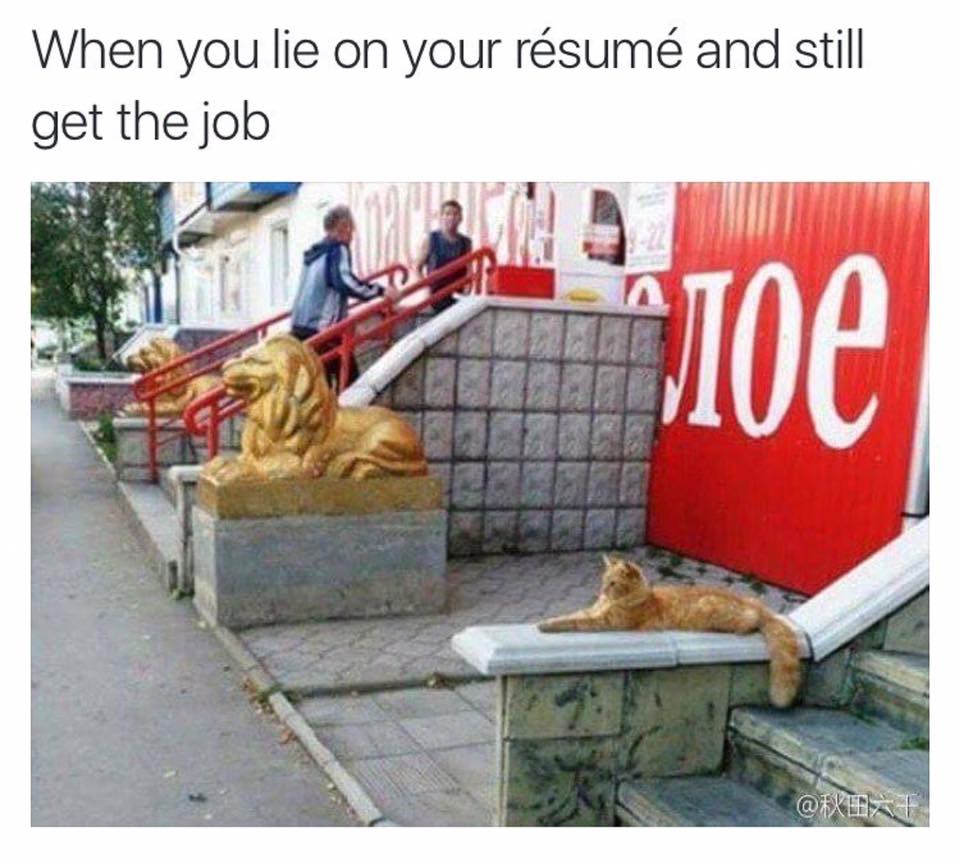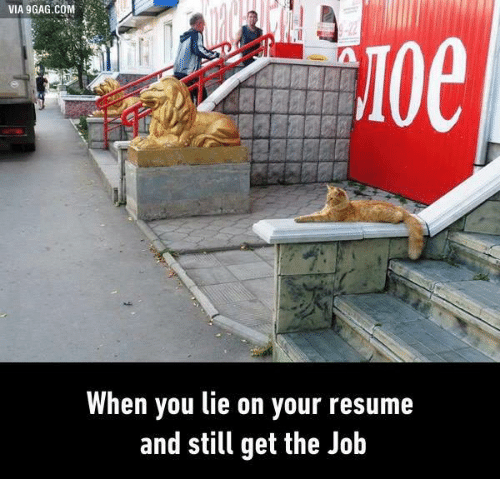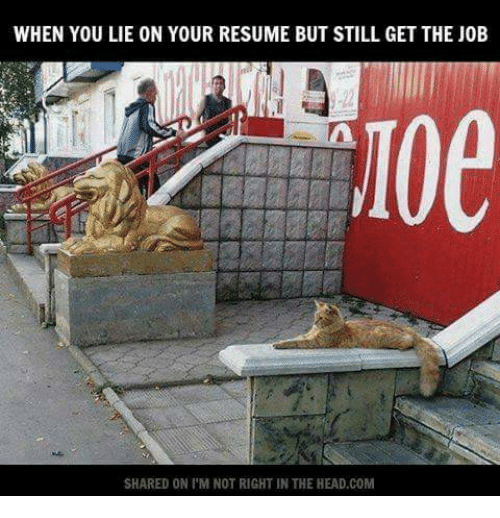Resume Lies You Need To Avoid
Last updated Nov 16, 2021 | Career Tips
The thing about lying on your resume is that you can get caught. Therefore, lies seem harmless until you are faced with consequences that can affect your long-term prospects.
These reasons will convince you not to lie for the sake of getting hired. So instead of stretching the truth, check out the best course of action that will still take you to the job of your dreams.
Why Do People Lie On Their Resume
Lying on a resume is surprisingly common. A 2020 survey of over 1,000 U.S. workers found that a staggering 93% of respondents know someone who lied on their resume. The most common resume lies were related to:
- Experience
- Skills
- Duties
While only 31% were caught, 65% of them were either not hired or fired from their role. Only 36% of respondents admitted that they had lied on their own resume. Of those who confessed, they were most likely to lie in these resume categories:
- Experience
When asked why they lied on their resume, respondents listed the following reasons:
- Long period of unemployment
- Wanted a higher salary for the position
- Didnt think they would get caught
- Not qualified for the position
The Lies Hiring Managers Are Willing To Let Slide
Yves Lermusi, CEO of Checkster, says it’s not totally surprising that candidates are most likely to lie about their skills or previous dates of employment.
“Exaggerating your skills may be seen as an easy thing to get away with in the interview process, as it’s difficult to check unless there is a skills test in the process,” Lermusi says. “In addition, candidates may assume that prospective employers won’t check with their previous employer to confirm details about their past work experience.”
That said, hiring managers seem to be lenient with candidates who stretch the truth. Just one in three would never hire a candidate who lied, leaving the remaining 66% of hiring managers who are willing to hire someone despite inflated claims.
The majority of people willing to hire someone who lied say they’d do so if the candidate had a “good explanation.” The next most common reason: if they can’t find any other candidates for the role.
The least egregious stretch of the truth is when candidates inflate their GPA, according to the 92% of hiring managers who would still hire someone who lied about their score.
Roughly half of hiring managers, however, say they would never hire someone who lied during a reference or background check.
“Moreover, misrepresenting applicants that are hired probably won’t last long in those jobs,” Lermusi says.
You May Like: How To Save Resume On Ipad
Revise Your Resume & Ask The Hiring Manager To Refer The New Copy
In this case, you can tell them you “noticed some errors” and “want to correct them.” Note that this won’t work if you’ve created jobs or performance claims that were exaggerated. However, you can truthfully state that you want to be “more exact,” if you wish. They may assume you had someone else write your resume and the errors were theirs.
That said, this isn’t always going to work.
How To Improve Your Cv Without Lying

Take the time to thoroughly research the company, by looking at their site, reading through the job description and finding out more about the employees that already work there.
Use this information to figure out the most relevant skills or qualifications you possess, and emphasize these as much as possible in your CV. Make sure that you position relevant expertise at the top of your application, to catch the attention of the employer and boost your chances of being invited to an interview.
Also, bring your hobbies and interests into the mix. Find ways to relate them to the company culture in order to show you are an ideal fit for the business. Make sure these come immediately after your qualifications and experience on your CV, and also include them in your cover letter, so the employer can see how your interests are relevant to the role.
Read Also: Where To Put Relevant Coursework On A Resume
Five Reasons Not To Lie On A Resume
When it comes to job search, your resume is the ultimate weapon in your armory that will help you win a battle and get a dream job. In todays competitive world, getting a job has become difficult.
A resume lets the hiring manager and interviewer know about the basic academics and skills of the job seekers. Considering this tough competition, lying on a Resume has become ideal for job seekers. That is a very erroneous and risky practice. Lets look at the five main reasons or core reasons for not lying on a Resume.
Lying On Job Application About References
Thinking of listing a friend or uncle in your references? If a company is serious about a candidate, they will most likely call up the references provided on the resume. And if the person you have listed to vouch for you will probably be unable to answer questions about your duties in your previous employment.
Read Also: Honors On A Resume
Stretching The Truth To Land The Job
Stacy Caprio, a 28-year-old from Boston, spent a college semester abroad in Hong Kong and took a level 1 Mandarin class while there. Afterward, she added an “elementary proficiency” in Mandarin to the accomplishments section of her LinkedIn profile.
“Several times during job interviews or other situations, people have seen that and asked if I can speak Mandarin,” Caprio tells CNBC Make It. “I always reply no, not at all I simply took one semester while studying abroad in Hong Kong.”
Caprio, who works as an online marketer, recognizes that including the foreign language may give the impression that she knows more Mandarin than she does. But, when asked about it in-person, even being honest about her limited proficiency has had its advantages.
“If nothing else, it is a good conversation starter and often leads to a discussion of what I learned living and learning in Hong Kong for half a year,” Caprio says, “and it makes my profile more interesting.”
Not all job candidates are as honest in-person. When surveyed about their willingness to lie during an interview, just under half say they did or would consider significantly inflating their role on a key project while discussing their work history with an interviewer. Other common lies at the interview stage include candidates saying they left a previous job when they were actually fired, making up relevant experience and saying they earned a higher salary than they actually did.
Explaining Gaps On Their Resume
Anytime you leave the workforce, there’s a chance you’ll have to address that gap on your resume when you finally decide to return to work. For 40% of parents looking to return to the workforce after the COVID-19 pandemic, explaining gaps on their resume was a top concern, rounding out the three biggest concerns they have in regards to their job search after being out of the workforce for a stretch of time.
What you can do: Optimize your and learn the right way to explain gaps on your resume. Also, if asked about gaps on your resume in an interview, don’t try to overexplain anything. A short, concise explanation will clear things up without making it seem like you’re hiding something.
If you’re a parent trying to return to work after the COVID-19 pandemic, you probably have at least one of the concerns mentioned above. Whether you’re worried about explaining gaps on your resume, finding a job with adequate pay, or finding the right job opportunities, there are ways to work around these job search challenges. Focus on what you can control in your job search, and you’ll be sure to successfully return the workforce sooner than you think.
Need more help returning to the workforce?
Don’t Miss: Resume For A 16 Year Old With No Experience
What Happens When You Lie On Your Resume
The hours of my work day are filled with resumes. Some of them are good, some are bad, and then there are those that arrive with too much detail or too little effort. No matter the content , each should have at least one thing in common the TRUTH.
Lately, my peers and I have been running into a common issue people are lying on their resumes .
There are many things people may choose to fib about on their resume, but the primary one my team and I have seen is the degree they claim to be awarded under education.
Example of education on a resume:
Education:
University of Northern Iowa
Bachelor of Science, Electrical Engineering 3.5 GPA
Looking at this, one would think this candidate earned their Bachelors Degree in Electrical Engineering, but thats not always the case, unfortunately.
Ill get back to the appearance of education on a resume, but Id like to pause here for a moment to tell you a story about an unfortunate incident involving a frustrated client, a regretful candidate and me.
Wed like to extend an offer! my client said.
These words are an absolute joy to hear in my industry.
After weeks of interviewing, I was overjoyed to call my candidate, offer him the position and talk about details. After he happily accepted the position, we had the routine talk about the background check and start dates.
A few days had passed before I received a surprise as I opened the background check on my candidate.
I had to ask why.
Education:
Should You Lie On Your Resume
That is the most common question that comes to almost every candidates mind when searching for a job. So, many candidates try to lie on resumes to get a better job. I recommend you not lie on your resume as there are many checks during the hiring process.
Also, read our other blog How to Make a Resume on Microsoft Word
Firstly, there is a Talent check during the interview. They ask some common questions such as so, you worked at this place what is your business unit? Etc. Some more checks are background checks, blind checks, etc. As many candidates use some common lies, it is straightforward for the interviewer to catch a lie.
Once you get caught, it will create a terrible impression on the company. A company never hired a candidate who was seen lying on their resume.
You May Like: Listing Gpa On Resume
Can U Lie About Your Gpa
It is very possible you will get caught if you exaggerate your GPA on your resume. Many companies conduct a thorough background check on an applicant before a job offer is considered final. If you lie or exaggerate with your GPA, you run the risk of being caught, which will result in the company rescinding an offer.
What Happens When You Lie On Your Resume 10 Hidden Dangers

- /
Should you lie on your resume?
Lying on your resume can be tempting when youve sent out many resumes and just arent getting interviews. You start to get discouraged, stressed, and probably a little angry.
However, in our opinion, its RARELY worth lying on your resume, and there are a lot of bad things that can happen when you lie to employers.
So we invited employment background check expert Michael Klazema to share what happens when you lie on your resume including some of the hidden dangers and risks you might not be aware of.
Don’t Miss: How To List Languages On Resume
You Really Dont Have To
If you dont have the exact skills an employer is looking for but still think you could be a good fit, make the case in your cover letter and let the hiring manager be the one to decide whether to call you in. Hiring managers are more open to people with transferable skills these days, meaning you don’t have to necessarily have direct experience in a field to be employed, says career coach Alex Simon. Let your credentials speak for themselves and make it clear youre willing to learn if necessary.
It’s far better to admit that you don’t know something, Davis agrees. Passion and eagerness to learn your way into a position is a far greater quality than being a liar. It’s the No. 1 quality I look for. Too many candidates sabotage their chances.
What Happens If You Lie On Your Resume
When drafting your resume, you may have wondered what would happen if you were to lie about certain elements. The repercussions of lying on a document such as your resume usually depend on what you lie about. While you should always tell the truth, it is not unheard of to misrepresent the facts.
In this article, we will explore what happens if you lie on your resume, what lies are likely to get caught and what to do if you have submitted a resume with a lie on it.
Related: What to Include on a Resume
Read Also: How To List Multiple Jobs At Same Company On Resume
Embellished Job Titles Often Sound Bogus
One of the most popular trends among job searchers these days is to embellish or inflate their job titles. The basic idea here is that applicants worry that their current job titles are too mundane or unimpressive to grab the interest of a hiring manager. As a result, they tweak those titles to make them sound more important.
For instance, a bartender at a restaurant might list his job as mixologist.One Reddit user who fixed chairs at a theater said his go-to job title embellishment was Chairman of the Theater Department. Thats an extreme case but there are countless other examples, and many of them sound bogus to experienced hiring managers. To avoid arousing suspicion, stick to the truth when it comes to your past job titles.
Secrets Dont Stay Buried
Marliee Jones worked for 28 years as the admissions director for the prestigious Massachusetts Institute of Technology. When she submitted her resume for the job in 1997, she lied and claimed to have three degrees when she actually had none.
An anonymous tip exposed the lie in 2007. When the school learned that Jones had inflated her credentials when she applied for the position years before. She was forced to resign.
Not only did Jones lose her job, her lie also erased the meaningfulness of the work shed done for MIT over the decade shes spent working there. Keep in mind that leaving a job under these kinds of circumstances is a crushing blow to your professional relationships, reputation and legacy.
Recommended Reading: Do You Put Gpa On Resume
You Never Get What You Really Want
Bending the truth is definitely an extreme step to demand the job hence, it is necessary to understand what you really want first.
It is true that seeing incompetent candidates does not captivate the hiring managers attention and you might be tempted to exaggerate on resume for the sake of securing your dream job. However, the important thing is you never get what you want with a pack of lies. Moreover, getting involved in things unsuitable for your talents will never take you to the dream.
As HR Managers take no time to research and find the truth behind fabricated information in profiles, there is a high chance that you will be caught red-handed too.
The Employer Conducts A Background Check
Not all employers conduct formal background checks. But if you encounter one that does, it will sink you if youre being untruthful. If a prospective employer conducts a background check and discovers youve lied about your work history, criminal past, education, professional certifications, or other key facts, dont expect a job offer.
This article was originally published by The Cheat Sheet. Reprinted with permission.
Read Also: How To List Dates On Resume
The Actual Terms Of Dismissal:
If you were laid off from the team for poor performance or similar other things, it is not necessary that you mention this in your resume. Stating the reason for quitting your previous jobs affects you as it reminds you of a poor experience of the past. There are firms that ask you whether you have ever been fired in the job application itself. It is wise to tell a lie in such situations rather than reveal the truth.
If you lie, the worst thing that can happen if the hiring managers discover the truth is that they may consider you for the position. The same thing would surely happen if you were honest and told them you were fired. In such situations, it is best to tell a lie. Remember that the firms will find it very difficult to find the truth from your past employers. When they ring up the firms, they will be redirected to the HR team. The HR team would confirm the fact that you worked for them but would say no further. It is better to tell a lie and increase your chances of getting the job than telling the truth and not even getting shortlisted for the interview.
Option 4 Withdraw Your Application

Another alternative is to withdraw your job application. You don’t have to give a reason why. You can simply thank the employer for the invitation and say you’re not interested in the position at this time. You have obviously lost your chance of getting the job, but this is the safest option if you don’t want to explain or to have to deal with the consequences of lying.
Also Check: Is My Perfect Resume Legit